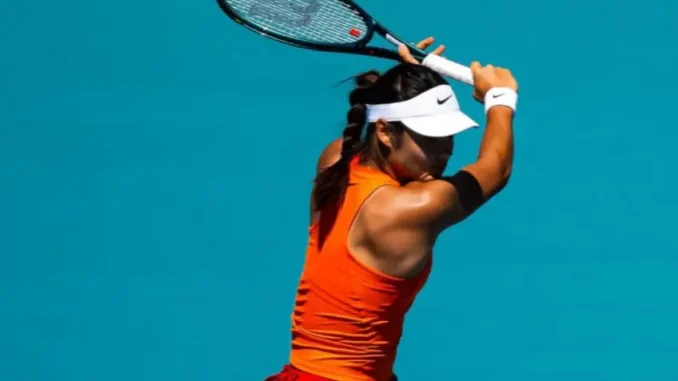
Emma Raducanu, the British tennis prodigy who stunned the world with her improbable 2021 US Open victory, remains a captivating figure in the sport at just 22 years old. Her meteoric rise as an 18-year-old qualifier in New York set an extraordinary precedent, but the years since have been a whirlwind of triumphs, injuries, and hard-fought lessons. Now, as she carves her path in the 2025 season, her former coach Mark Petchey has offered a candid assessment of the obstacles she faces against the game’s most dominant players, illuminating the steep climb ahead if she is to recapture Grand Slam glory.
Raducanu’s 2025 campaign has been a testament to her resilience. After a challenging 2023 sidelined by wrist and ankle injuries, she has battled her way back to No. 35 in the WTA rankings. Her season highlights include a semifinal run at the Citi Open and quarterfinal appearances in Miami and Queen’s, showcasing the flair that once made her a household name. Yet, her journey hit a familiar snag at the 2025 US Open, where she fell in the third round to Elena Rybakina in a lopsided 6-1, 6-2 defeat. The match laid bare a persistent challenge: Raducanu’s struggles against power players who overwhelm with sheer force.
Mark Petchey, who coached Raducanu briefly in 2020 and again earlier this year, pinpointed the issue with clarity. “These big hitters, these power players that make life difficult for her where they do rush her, are going to make things tricky for her,” he explained. Players like Rybakina, Aryna Sabalenka, and Amanda Anisimova wield aggressive, high-velocity shots that disrupt Raducanu’s rhythm, pushing her into a defensive posture. Unlike these opponents, Raducanu’s style hinges on agility, precise redirection, and baseline mastery rather than raw power—a dynamic that leaves her vulnerable when opponents dictate the pace with unrelenting aggression.
Still, Petchey sees these setbacks as fuel for growth. “It’s just motivation for her to keep working on the things that she has been doing,” he said, urging Raducanu to sharpen her baseline game and bolster her serve’s consistency. He believes her path to success lies in proactive play—redirecting shots, varying angles, and forcing opponents to move before they can settle into their power game. “Redirecting the ball, moving it around, trying to get the opponent to move before they get a chance to set on the ball,” he noted, is where Raducanu can turn the tables. Executing this strategy against the sport’s elite, however, demands both precision and unshakable confidence.
A significant shift in Raducanu’s journey came with her recent coaching change. After parting ways with Petchey due to his broadcasting obligations, she enlisted Francisco Roig, a seasoned coach who contributed to Rafael Nadal’s 22 Grand Slam titles. Roig’s technical expertise, praised by Toni Nadal as exceptional, is expected to refine Raducanu’s strokes and equip her to better handle high-paced opponents. “Francis is a very good coach and a man who can help Raducanu to improve technically,” Toni Nadal remarked, highlighting the need for a balance between power and control in modern tennis. Raducanu herself is optimistic about the collaboration, stating, “He’s obviously got a bank of experience, and I’m very excited to continue working with him.”
The challenge ahead is daunting. Raducanu’s 0-6 record against top-10 players since her US Open triumph underscores the gap she must close. Yet, her tenacity is undeniable. In 2025, she has competed in more matches than in any prior season, gaining the match experience that tennis icon Martina Navratilova deems essential. “It all comes down to ‘can you do it during matches?’” Navratilova observed, suggesting that Roig’s influence will be tested in the heat of competition.
Raducanu’s next opportunities to prove herself come at the Korea Open in Seoul, where she has secured a wildcard entry, followed by WTA 1000 events in Beijing and Wuhan. These tournaments offer critical chances to measure her progress against top-tier competition. Petchey remains a staunch believer in her potential, praising her enduring drive. “Her desire to be able to do what she did back in 2021 is as great as I remember it,” he said, adding that her intangibles—her “complete courage” and athletic prowess—set her apart. “She’s got something that you can’t teach,” he emphasized.
The weight of expectations, both external and self-imposed, looms large. Raducanu’s 2021 US Open victory raised the bar to dizzying heights, and as Petchey noted, “Having set the bar so high so early on in your career, every week you are measured not just by other people’s expectations but also your own.” Still, with Roig’s guidance and her unrelenting work ethic, Raducanu is well-positioned to evolve. Her story—a blend of raw talent, fearless determination, and an ongoing quest to conquer the game’s powerhouses—continues to grip the tennis world. Whether she can overcome these challenges and cement her place among the sport’s elite remains an open question, but her journey is one of unrelenting ambition and heart.
Leave a Reply